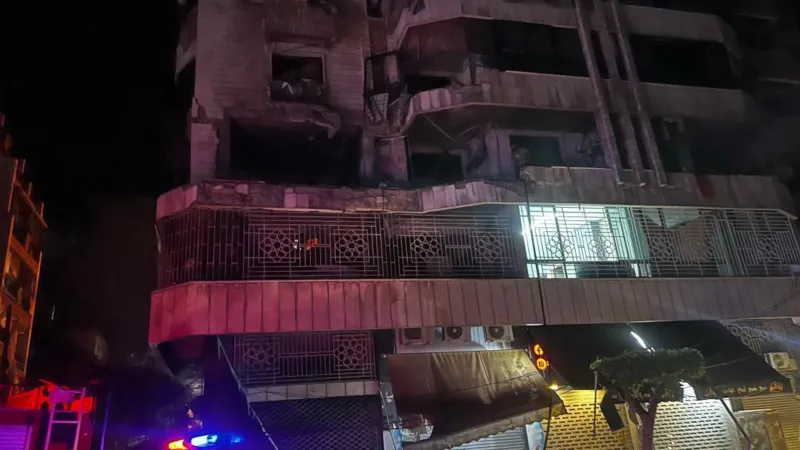
Introduction
Today’s news from Beirut paints a grim picture as tensions between Israel and Hezbollah continue to escalate, leading to severe destruction and loss of life. Israeli airstrikes targeted central Beirut again today, hitting a Hezbollah-affiliated rescue facility, resulting in significant casualties. These developments come as part of the broader conflict between Israel and Hezbollah, which has seen a series of retaliatory attacks following heightened military operations between the two sides. In this article, we’ll delve into the most recent events in Beirut, their broader geopolitical implications, and how the international community is reacting.
H1: Israeli Airstrikes Hit Hezbollah Facility in Beirut
Early this morning, Israeli forces launched another deadly airstrike on central Beirut, targeting a Hezbollah rescue and health facility. The airstrike killed at least six people and injured several others. The facility, which was located in a densely populated residential area in the Bashoura district, housed emergency services linked to Hezbollah. This marks the second attack on central Beirut in less than a week.
The explosion shook the city, with buildings swaying in the aftermath. Residents in the southern suburbs, traditionally Hezbollah strongholds, were issued warnings to evacuate by the Israeli military, further exacerbating the humanitarian crisis(
Malay Mail ).
H2: The Broader Conflict with Hezbollah
These attacks come amid ongoing skirmishes between Israel and Hezbollah. Tensions have remained high since the beginning of the war between Hamas and Israel last year, with Hezbollah frequently engaging in cross-border exchanges of fire. While Hezbollah has primarily launched missile strikes and deployed ground troops in response to Israeli incursions, the airstrikes on Beirut have signaled a shift in Israel’s tactics, with the capital now bearing the brunt of the conflict.
Hezbollah’s retaliation has been fierce. In a separate development, Hezbollah claimed responsibility for destroying multiple Israeli tanks and forcing Israeli troops to retreat during clashes near the Lebanese border(
Malay Mail ).
H3: Casualties and Civilian Impact
Lebanon’s health ministry reports that at least 1,928 people have died in the conflict since fighting intensified nearly a year ago. Just in the past 24 hours, 46 people have been killed, with scores injured in the southern suburbs of Beirut and other parts of the country.
The humanitarian situation in Beirut is dire, with hundreds of families displaced and vital infrastructure, including medical facilities, being destroyed. The Lebanese government and international organizations are scrambling to provide relief to the civilian population, but aid efforts are hampered by ongoing military operations(
Malay Mail ).
H2: International Reactions and Evacuations
The international community is closely monitoring the situation in Beirut, with several nations launching evacuation plans for their citizens. The UK, Australia, and Japan have initiated airlifts and booked commercial flights to facilitate the safe exit of their nationals from Lebanon. As of today, more than 700 British nationals and their families have been evacuated, while Australia has secured seats for approximately 1,700 people on flights to Cyprus(
Malay Mail ).
In the wider Middle East, the conflict is fueling concerns of a regional escalation. Iran, a key backer of Hezbollah, has issued a stern warning to Israel, stating that continued aggression will be met with severe consequences. Iran’s involvement in the conflict, particularly its support for Hezbollah, remains a focal point of concern for regional stability.
H3: Beirut’s Future Amid Ongoing Conflict
Beirut, a city that has historically been at the crossroads of regional conflict, is once again caught in the crossfire. The destruction in the southern suburbs and central districts poses a significant threat to the city’s recovery from previous conflicts. The economic crisis gripping Lebanon, combined with the devastation caused by the ongoing conflict, raises critical questions about the city’s future.
The United Nations and several humanitarian organizations have urged for immediate de-escalation to prevent further civilian casualties. However, with both Israel and Hezbollah seemingly locked into a cycle of retaliatory violence, a peaceful resolution appears elusive.
Conclusion
Beirut finds itself in the midst of yet another crisis, with no end in sight to the violence. The latest Israeli airstrikes, particularly on civilian and health facilities linked to Hezbollah, have further inflamed tensions. As international powers step in to evacuate their citizens and de-escalate the situation, the people of Beirut are left grappling with the harsh realities of war.
For ongoing coverage of Beirut and the wider Middle East conflict, visit our website at Newsify, where you can stay up to date on the latest developments









Leave a Reply